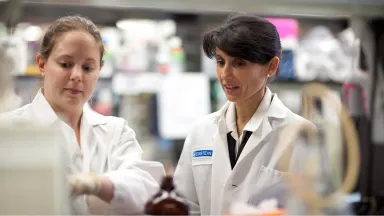
Allen M. Spiegel, M.D.
- Professor, Department of Medicine (Administration)
- Professor, Department of Molecular Pharmacology
- Dean Emeritus
Location
- Albert Einstein College of Medicine Jack and Pearl Resnick Campus 1300 Morris Park Avenue Belfer Building 1003 Bronx, NY 10461
Research Profiles
Professional Interests
Allen M. Spiegel, M.D., an internationally recognized researcher and endocrinologist, assumed office as Dean of the Albert Einstein College of Medicine of Yeshiva University on June 1, 2006.
Prior to joining Einstein, Dr. Spiegel was Director of the National Institute of Diabetes & Digestive Diseases & Kidney Diseases (NIDDK) at the National Institutes of Health, the culmination of a distinguished 33-year-career at the NIH.
A member of the Institute of Medicine of the National Academy of Sciences, Dr. Spiegel earned his bachelor's degree summa cum laude and Phi Beta Kappa from Columbia University in 1967. He received his M.D. degree cum laude from Harvard Medical School in 1971 and completed his clinical training at Massachusetts General Hospital.
He began his career at the NIH in 1973 as a Clinical Associate in its Endocrinology Training program. He then served as a Senior Investigator in the Metabolic Disease Branch from 1977 to 1984. In 1985 he was appointed Chief of Molecular Pathophysiology, and then Chief of the Metabolic Diseases Branch. In 1990, he was appointed Director of the NIDDK's Division of Intramural Research. He served in these various capacities until his appointment as Director of the NIDDK in 1999. In this role, Dr. Spiegel had responsibility for a staff of 625 full-time employees and a $1.7 billion budget.
Dr. Spiegel is a widely renowned physician-scientist and endocrinologist with extensive experience in translational research programs. His research has centered on G-protein-regulated signaling dysfunction in human disease, and his work on signal transduction helped to clarify the genetic basis of several endocrine diseases. He has published extensively, with more than 250 peer-reviewed papers and 100 reviews and book chapters to his name, as well as two books on G proteins.





